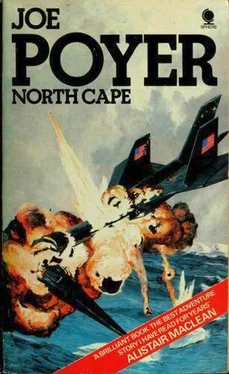“Yeah, I know. Now get below, before I call a marine to escort you.” Folsom watched fondly as Larkin went below to his quarters, then he turned and went back to the plotting table. He studied the map and the course he had laid out to the rendezvous point for a long while, then he went to stand before the screen. He reached down and flicked on the searchlights and swiveled them around to scan the sea on both sides of the bow. Clean circles of light were cut into the mountainous waves by the two million candlepower lights, which picked green out of the freezing Arctic waters and gleamed off white crests now blowing in the same direction as the RFK. He concentrated on the motion of the ship under his feet and found that she was moving in a rhythmic dance in time to the roll of the waves under her keel. Darkness had fallen in all of its intensity. The frozen air glistened with a million scattered stars, the very crispness of their light indicating the depth of the cold. Low on the southern horizon was the storm bank, spun out from the leading edge of the storm. Folsom knew that the seas would be at their worst in that area. But they could run on into the sheltering lee of the Soviet coast, safe in the knowledge that no Russian ship or aircraft could put out to look for them, nor would submarines be cruising near enough to the storm-wracked surface to spot them electronically. By the time the storm abated enough for the Russian Navy to resume regular patrols, they should be putting into the Glyde, their intermediate base before sailing for Newport Naval Base, Rhode Island.
Folsom turned away from the screen and started his regular watch tour of the various consoles, checking on the condition of the ship. He was still worried about the deck heaters. Even with the extra heat being piped up from the reactor cooling system, they still were not coping with the ice. Perhaps, now that they were running before the waves, they would not be taking aboard as much spray, not unless the wind veered, anyway. And to judge by the satellite photos of the storm center, if they maintained present speed and heading they would sail into a radial arm of wind within two hours. Then they would be taking the wind and spray across the bow quarter as well as one hell of a cross chop from the waves as the wind tried to push incalculable gallons of sea water from their already set path. It was going to be one hell of an afternoon. Two hours later Folsom was ready to modify his judgment as to what kind of afternoon it would be, but modify it downward. He turned away from the ship’s intercom. Barrows, the engineering officer, had every right to be extremely unhappy with Folsom, but his voice had been steady enough, with no hint that he did indeed blame the executive officer. Barrows had just finished reporting that the main condenser system had frozen solid. It had been Folsom’s order to use the major part of the reactor heat to feed the deck heaters. This meant that the heat normally used to maintain the condenser system at an even 36°F had to be channeled into the deck heaters and the reactor crew had to vary the power output to control the condenser system by hand. When Larkin had called for full emergency power from all engines, an overload had been thrown onto the condensers. The temperature had dropped quickly while the reactor worked at full power, until, when the engines had been cut back to one third, the temperature in the condensers stood at 33°F. The reactor crew had gone furiously to work to try and bring the temperatures back up to a safe 36°F, but in the succeeding two hours the system had oscillated widely, and, finally, the first seed crystal of ice had formed in the outside banks. Even rechanneling all heat being fed to the decks had not been enough to stave off the rapid icing. Five minutes later the webbing of pipe was full of half-frozen slush. Barrows had closed down the main system and shifted to the auxiliary condensers. If needed, he could go directly to sea water, but the resulting corrosion would mean a major overhaul for the system and two months in drydock to complete the job. Damn it all, Folsom swore to himself. Why now of all times? This whole blasted cruise seemed to be jinxed. First the collision, then the storm, and now the condenser system. What in the name of the God was next? Barrows estimated that he would need at least three to four hours to thaw and flush out the condensers. In the meantime the auxiliary banks could handle slightly less than eight knots speed. That in itself would put them nearly forty minutes behind on the rendezvous.
He snapped on the intercom and punched the code for engineering viciously. “Chuck, use the auxiliaries. If you can’t get the main condensers thawed in three hours, we’ll have to use the boost engines to make up forty minutes.”
“Right, sir. I’ve got a crew checking them over right now. How does the deck ice look?”
“Just a minute.”
Folsom turned and pressed against the glass. The decks showed up clearly in the searchlights. The glare from the ice was strong, but not so strong that he could not make out the forward winch boom lying horizontal on the deck where it had been lashed. It was covered by ice that barely showed a mound. The’ boom, when horizontal, lay three feet above the deck.
“Still too damn thick for me,” he said into the intercom. “But that’ll have to wait. Use all the reactor heat you need to get those condensers thawed!” Teleman lay relaxed in the acceleration couch, Jotting the liquid pulsing of the aircraft flow placidly through his body. The PCMS was bringing him slowly out of a two-hour nap, a much-needed nap that, while it would not completely restore him, would bring his body systems to the point where the proper dosages of amphetamines could keep him awake and completely aware. He eased the couch forward into a semisitting position and lazily scanned the ground control monitor currently displaying the Pomeranian coastline of Poland 180,000 feet below. Even at this distance he could see specks of white dancing on the surface of the Baltic Sea as it rolled and thrashed to the commands of the storm front beginning to reach across northern Europe.
In Hamburg, less than three hundred miles west, it would be colder than the gates of hell a thousand years before the fires were lit, he thought. It always seemed that the bottom had fallen out of the thermometer when one of these Arctic storms came sweeping out of the Baltic into Germany. He recalled with fondness the two years he had spent with the Defense Intelligence Agency in Europe. He had toured Europe from the Baltic to the Mediterranean and Belgium to Rumania — all but Scandinavia, with the exception of Denmark. He had never crossed the Kattegat. For some reason he had kept putting off Norway and Sweden and Finland, meaning to cross the channel, but never quite making it. He shrugged in a half stretch to ease cramping muscles and shook. himself out of his reverie. One of these days he would go back, and Scandinavia would be first on his list. By now he could make out the southern coast of Sweden lying beyond Bornholm Island. The cloud cover was closing in quickly below and the northern end of the Baltic Sea had turned slate gray. Patches of cloud to the west were beginning to glow red in the waning twilight.
Teleman was heading directly north across the Baltic toward the Gulf of Bothnia. He would fly up the length of the gulf, then over the curve of the Scandinavian Peninsula where Sweden joined Finland. By following the twenty-fifth meridian due north, in less than two hours he would enter Norwegian airspace north of Finland. Then, twenty minutes flying time later, he would rendezvous with the Robert F. Kennedy off the North Cape, completing a twelve-thousand-mile round trip, dump his information, and head home.
“And a damn good thing, too,” Teleman said aloud to hear his own voice. Rendezvous was still some 2500 miles away and the gauge needles for his main tanks were already well into the empty zone. Shortly he would have to switch to the reserve tanks with their two-thousand-mile additional range. By that time, he figured on his knee pad, he should be somewhere in the vicinity of the Finnish coast. He was also going to come onto the rendezvous point nearly thirty minutes late. Teleman wondered how the ship was going to take that. He hoped to hell that they would have a refueler standing by. The flight plans be had been given hours ago called for him to swing west and rendezvous with the tanker over Iceland. At this rate he would be lucky to make the Cape. Directly below, he caught a fading glimpse of Gotland sliding through the clouds. The cloud cover was closing down fast and he wondered idly whether or not he would be able to see the lights of Stockholm as he passed over the city.
Читать дальше












